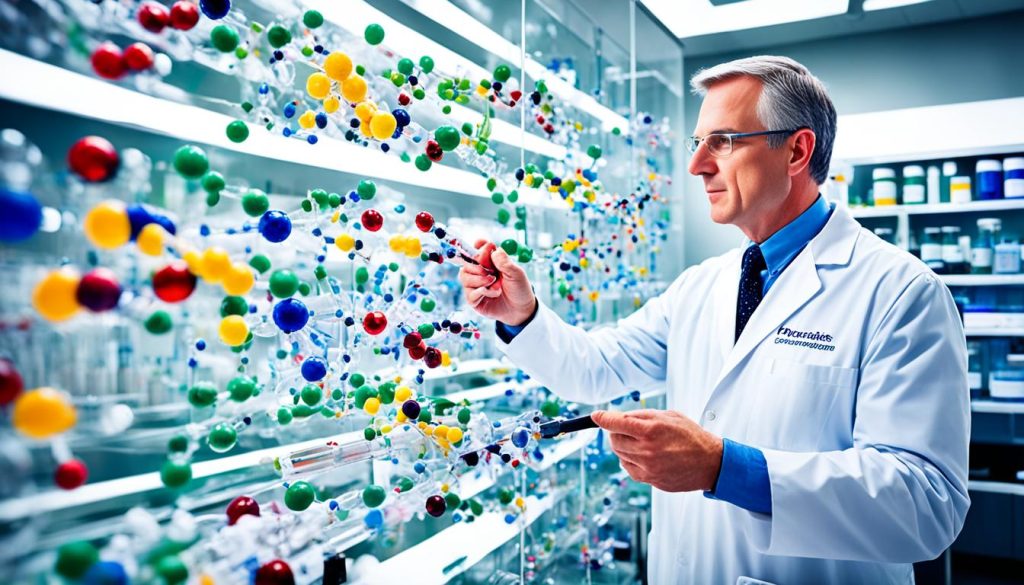Did you know that the global biotech market is projected to surpass $3.44 trillion by 2030? Biotechnology, also known as biotech, is revolutionizing medicine, agriculture, and global health on an extraordinary scale. With its exponential growth, biotech is shaping the future of various industries and offering new opportunities for professionals in the life science field.
Key Takeaways:
- Biotechnology is making significant contributions to healthcare, energy, and agriculture.
- Gene editing, particularly with CRISPR technology, is revolutionizing medicine and agriculture.
- Personalized medicine tailors healthcare to individual genetics, lifestyle, and environmental factors.
- Biopharmaceuticals derived from living organisms are transforming therapeutic approaches.
- The future of biotechnology offers opportunities to shape a healthier and more personalized future.
Gene Editing: Revolutionizing Medicine and Agriculture
Gene editing, particularly with CRISPR technology, is revolutionizing the fields of medicine and agriculture. With its ability to modify DNA sequences with unprecedented accuracy, CRISPR, or Clustered Regularly Interspaced Short Palindromic Repeats, holds the promise of correcting genetic abnormalities and treating hereditary diseases in humans. This breakthrough technology has the potential to transform the way we approach healthcare and agriculture.
In medicine, gene editing offers new opportunities for the treatment and prevention of various genetic disorders. By directly targeting the underlying genetic causes of diseases, gene editing techniques enable scientists to develop precise and personalized therapeutics. This has the potential to revolutionize the management of hereditary diseases, such as cystic fibrosis, sickle cell anemia, and muscular dystrophy.
“Gene editing has opened up a whole new world of possibilities in medicine. We can now envision a future where genetic abnormalities that were once thought to be untreatable can be corrected, offering hope to millions of individuals and their families.” – Dr. Jane Mitchell, Geneticist
Furthermore, gene editing holds significant implications for agriculture. By modifying the genetic makeup of crops, scientists can enhance yields, improve nutritional profiles, and increase resistance to pests and diseases. This has the potential to address global food security challenges and contribute to sustainable agricultural advancements.
| Applications of Gene Editing in Medicine and Agriculture | Benefits |
|---|---|
| Treating hereditary diseases | – Correcting genetic abnormalities |
| Improving crop traits | – Enhanced yields |
| – Improved nutritional value | |
| – Increased resistance to pests and diseases |
Gene editing technology has already demonstrated its potential in both medicine and agriculture, but it is still a relatively new field with ongoing research and development. Further advancements and ethical considerations will shape the future of gene editing, ensuring its safe and responsible use.

As we continue to unlock the potential of gene editing, it is essential to strike a balance between innovation, ethics, and regulatory frameworks. Collaborative efforts between scientists, policymakers, and other stakeholders are crucial in harnessing the full potential of gene editing to benefit human health and global food production.
Personalized Medicine: Tailoring Healthcare to Individual Genetics
Personalized medicine is revolutionizing the healthcare industry by tailoring treatments to each individual’s unique genetic makeup, lifestyle, and environmental factors. With advancements in DNA sequencing technology, personalized medicine has become more accessible and applicable across various medical fields.
By analyzing an individual’s genetic makeup, healthcare providers can gain valuable insights into potential health risks, specific disease susceptibilities, and optimal treatment approaches. This proactive approach allows for the early detection and prevention of diseases before they manifest, leading to improved patient outcomes.
The integration of lifestyle and environmental factors along with genetic information plays a crucial role in developing personalized treatment plans. Understanding how an individual’s lifestyle choices and exposure to environmental factors impact their health enables healthcare providers to customize interventions and enhance disease management strategies.
Benefits of Personalized Medicine
Personalized medicine offers numerous benefits to both patients and healthcare providers:
- Accurate and precise diagnosis: Genetic testing allows for the identification of specific genetic variations that may contribute to diseases, enabling accurate diagnosis and targeted treatment.
- Improved treatment efficacy: By tailoring treatments based on an individual’s genetic profile, healthcare providers can increase the effectiveness of therapies while minimizing adverse side effects.
- Preventive interventions: Personalized medicine empowers healthcare providers to implement preventive measures by identifying individuals at higher risk for certain diseases. This proactive approach can lead to early interventions and improved health outcomes.
- Optimized medication selection: Genetic information can help predict an individual’s response to certain medications, allowing healthcare providers to select the most appropriate drugs and avoid potential adverse reactions.
The global market for personalized medicine is projected to exceed $869.5 billion by 2031, indicating the growing recognition and widespread adoption of this transformative approach in healthcare.
“Personalized medicine allows us to move away from the one-size-fits-all approach and deliver targeted treatments that address the specific needs of each patient.” – Dr. Emily Thompson, Chief Genomic Officer at GenX Medical Center
Healthcare providers are embracing personalized medicine as it holds the potential to significantly improve patient care, enhance treatment outcomes, and reduce healthcare costs. Additionally, ongoing advancements in genetic research and technology are expanding the scope of personalized medicine, paving the way for further breakthroughs in disease prevention and management.

| Advantages of Personalized Medicine | Challenges |
|---|---|
|
|
Biopharmaceuticals: Transforming Therapeutic Approaches
Biopharmaceuticals, derived from living organisms, are revolutionizing the field of medicine. These innovative therapeutic agents, including monoclonal antibodies, vaccines, and gene therapies, offer precise and effective treatment options that traditional drugs often struggle to achieve. The advancements in biopharmaceuticals have the potential to transform the landscape of healthcare, providing tailored solutions for various medical conditions.
Monoclonal antibodies are one of the key components of biopharmaceuticals, designed to target specific cells or proteins in the body. These antibodies can be customized to attack cancer cells, autoimmune disorders, or infectious agents more effectively. By harnessing the power of the immune system, monoclonal antibodies provide a targeted approach that minimizes side effects and enhances therapeutic outcomes.
Vaccines, another category within biopharmaceuticals, have played a crucial role in disease prevention for decades. They stimulate the body’s immune system to produce a protective response against infectious pathogens and have been instrumental in eradicating diseases such as smallpox and polio. With ongoing research and development, vaccines continue to be a vital tool in global health, tackling emerging diseases and combating existing ones.

Gene therapies are a rapidly evolving area within biopharmaceuticals, offering hope for treating genetic disorders at their root cause. By targeting faulty genes responsible for certain diseases, gene therapies aim to correct the underlying genetic abnormalities and potentially provide long-lasting or even permanent solutions. This groundbreaking approach holds immense potential for conditions that were previously considered untreatable.
Research and development in biopharmaceuticals continue to thrive, driven by the need for innovative and effective therapeutic options. Scientists and pharmaceutical companies are investing heavily in biotechnology to discover novel drugs and advance existing treatments. Additionally, the biopharmaceutical industry relies on regulatory affairs professionals to ensure compliance with strict guidelines and regulations while bringing these transformative therapies to the market.
The surge in biopharmaceuticals offers diverse career opportunities for professionals interested in research, development, and regulatory affairs. With the continuous growth and advancements in this field, individuals can contribute to improving patient outcomes and shaping the future of medicine.
Conclusion
The biotechnology industry has a promising future, with professionals in the life sciences field leading the way in revolutionizing healthcare, disease management, and personalized treatments. With biotechnology at the forefront, we have the opportunity to shape a healthier and more personalized future for all.
As the industry continues to evolve, it is essential for professionals to stay updated on the latest biotech news and actively engage with advancements in the field. By staying informed and dedicated to our expertise, we can contribute to the growth and impact of biotechnology in the years to come.
As healthcare becomes increasingly personalized, biotechnology plays a crucial role in driving innovation. The ability to tailor treatments based on individual genetic makeup, lifestyle, and environmental factors has the potential to revolutionize disease management and healthcare outcomes.
Looking ahead, the future outlook for the biotechnology industry is bright. With continued advancements, we can expect even more breakthroughs in healthcare, personalized medicine, and disease management. By harnessing the power of biotechnology, we can transform the way we approach healthcare and ensure a better future for all.


